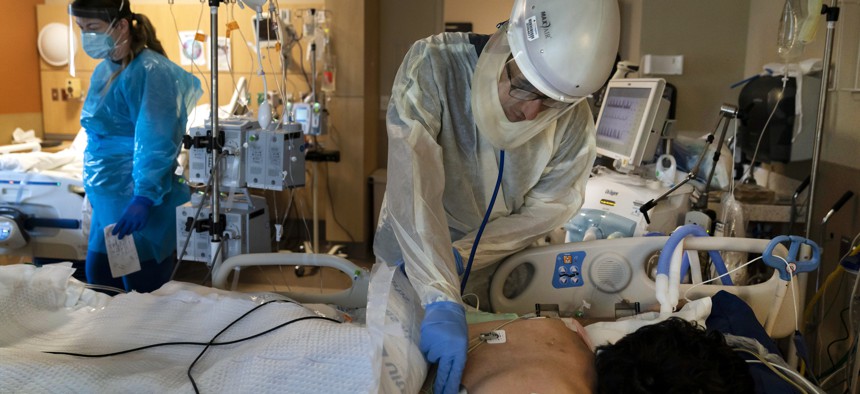Hospitals, ICU Beds Reach Capacity Across U.S. as Pandemic Surges

In this Nov. 19, 2020, file photo, Dr. Rafik Abdou checks on a COVID-19 patient at Providence Holy Cross Medical Center in the Mission Hills section of Los Angeles. AP Photo/Jae C. Hong
STATE AND LOCAL ROUNDUP | DOJ investigates Kansas City’s contracting policies… cities expand pilot programs providing guaranteed income... Mississippi prisons deal with understaffing.
At least 200 U.S. hospitals were at full capacity last week, and a third of hospitals had more than 90% of beds in their intensive care units occupied, according to the U.S. Department of Health and Human Services. Across the country, an influx of patients severely sick with Covid-19 is stressing hospital capacity. HHS released detailed geographic information on coronavirus patients in hospitals for the first time this week to provide more information about the spread and impacts of the virus. Some areas of the country are worse off than others. One in 10 Americans—across a large swath of the Midwest, South and Southwest—lives in an area where intensive care beds are either completely full or fewer than 5% of beds are available. At these rates, public health experts said standards of care may be difficult or impossible to maintain. “There’s only so much our frontline care can offer, particularly when you get to these really rural counties which are being hit hard by the pandemic right now,” said Beth Blauer, director of the Centers for Civic Impact at Johns Hopkins University. Doctors said the rising infection numbers will likely continue to get worse as people who travelled over Thanksgiving may have contracted the virus and spread it when they returned home. Wednesday marked a record single-day high for Covid-19 related deaths, with 3,124 reported, according to Johns Hopkins University. That same day, 106,688 people were in hospitals being treated for complications from Covid-19 and another 221,000 new infections were reported. Some public health experts urged state and local policymakers to take hospital bed shortage data into consideration when considering closures or other mandates. “If you’re living in a place where there’s no I.C.U. bed for 100 miles, you have to be incredibly careful about the social interaction that you allow the community to take,” Blauer said. [NPR, CNN, New York Times]
KANSAS CITY CONTRACTING | The U.S. Department of Justice is investigating whether Kansas City, Missouri’s public contracting and procurement practices violate anti-discrimination protections. Kansas City sets aside about 30% of its public contract dollars to “favor certain people because of their race and sex and disfavor others,” the DOJ said. Mayor Quinton Lucas defended the city’s programs, which he said helps small businesses owned by minorities and women. “The fact remains that for decades in Kansas City, small businesses owned by minorities and women received significantly fewer contracts and contract dollars than would be expected given their availability in the geographic market from which the City procures,” he said. [Kansas City Star, WDAF-TV]
GUARANTEED INCOME | A pilot program that is providing a modest version of a guaranteed basic income to American families now has additional funding to allow 26 cities to start or expand programs. Twitter CEO and billionaire Jack Dorsey donated $15 million to the Mayors for a Guaranteed Income to expand the initiative. Richmond, Virginia is one city that had already allocated $240,000 to provide $500-a-month payments to 18 families. The city will now be able to make $500 monthly payments to 37 more families for the next two years. Through the initiative, cities are providing the supplementary payments to families who do not qualify for public benefits but whose incomes are not enough to cover monthly bills and emergencies. [Richmond Times-Dispatch, Mayors for a Guaranteed Income]
UNEMPLOYMENT CLAIMS | The latest jobless claims show 1.3 million people applied for some type of unemployment insurance last week. That includes 853,000 people who applied for regular state unemployment insurance and 428,000 who applied for Pandemic Unemployment Assistance. [Department of Labor]
MISSISSIPPI PRISONS | MIssissippi state officials have failed to enforce contractual penalties that would punish private companies when they are unable to staff state prisons with the required number of guards. When Management & Training Corporation is unable to provide the required number of guards per shift, the private staffing company is supposed to repay the state the wages plus a 25% penalty. But records show the amount of repayments made for understaffing at the Marshall County Correctional Facility dropped from $700,000 in 2017 to only $23,000 in 2018, even as staff vacancy rates rose. MTC did not pay any reimbursements for two other prisons, despite documented understaffing. [The Marshall Project]
Andrea Noble is a staff correspondent with Route Fifty.
NEXT STORY: As Coronavirus Continues, State Lawmakers Debate How to Meet Safely





